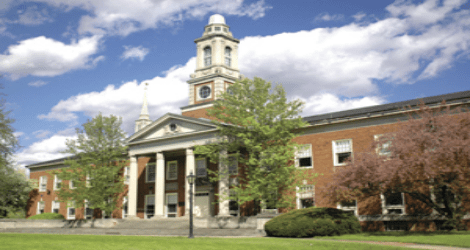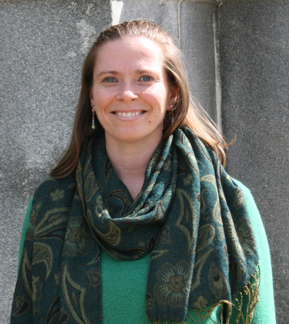Pittsburgh Theological Seminary
One Seminarian’s Perspective
By Kelly Jean Norris-Wilke View and print as PDF.
View and print as PDF.
I am standing on pavement covered in graffiti. Letters from friends and loved ones spray-painted onto the black top. Letters saying goodbye to a seventeen-year-old community member shot on this spot on a Sunday night. It is Good Friday, and a pastor from our group calls out, “Where, O death, is your victory? Where, O death, is your sting? We feel it here among us.” This event is part memorial service, part community advocacy. Organized by Pittsburgh Theological Seminarian April Roebuck, there are five local pastors present and even more churches represented. We come to mourn for a young man none of us knew. We come to mourn for our community. We come to advocate for peace and justice.
I suppose that all of our urban seminaries might share similar stories. The beauty and tragedy of being in Pittsburgh is that there is much work to be done. True, our seminary stands behind a large iron gate. The campus is safe. I love to watch the magnolia tree bloom on our front lawn where students play ultimate Frisbee and our pre-kindergarteners play tag with their seminarian teachers. Like many churches today, we run the risk of becoming inward focused, missing the larger community beyond our gates. Criticism that we can lock ourselves away in a campus bubble can be accurate. I’ve heard community members say they never knew that behind the bars was a training ground for pastors. Yet, many choose to engage our broader community; Christ compels us to come out from behind the iron gates and advocate for social justice and peaceful communities.
For me, a second-year student and co-chair of Peace & Justice Fellowship (PJF), Pittsburgh Theological Seminary (PTS) is an exciting place to be. Coming from teaching in the Philadelphia School District, I was attracted to the many urban opportunities that PTS could provide. I entered as a dual-enrollment student to get a Master of Divinity at PTS and a Juris Doctor (J.D.) at Duquesne University, hoping to do social justice work upon completion of each. Although only a few students have completed their dual degrees, this partnership, similar to the well-attended partnership in Social Work at the University of Pittsburgh, has existed since the 1970s. I was also attracted to the Metro-Urban Institute, which aims to help churches meet the needs of those living in urban contexts. These programs suggest that there is strong institutional support for social justice work on campus.
As with most students, God continues to lay out the path before me, and my efforts have turned from law toward church planting. The Pittsburgh Presbytery has supported the development of nine new churches in the past twelve years. Although I have yet to visit all of them, I can say they are places where issues of community justice are taken seriously. Some are plants within immigrant populations where church leadership and members work to bring services to those who need them most. Last month, PJF specifically focused on the needs of local immigrants. Leaders in the community from both Christian and Jewish organizations shared their wisdom for showing hospitality, for helping with legal challenges, and for advocating for newcomers from other nations. In a forum, Dr. van Driel, Assistant Professor of Theology, spoke passionately to give students a theological framework to understand our own position as strangers in a foreign land, our true citizenship being the Kingdom of God. Dr. Hainsworth, Assistant Professor of Ethics, followed by asking us to think about the ethical implications of our language (e.g., using the word “illegals” to describe a people who are seeking the wellbeing of their families by coming across national borders) and asking us to be curious about the root causes of immigration.
___________________________________________
Yet, I also stand in my own brokenness and in the struggle of a city still plagued by racial
segregation, by gun violence, by economic injustice, and I see that the divisions in our city extend into our churches and onto our campus as well.
___________________________________________
In other recent church plants, social justice advocacy is written right into the DNA of the new worshiping community. One church has two recent Pittsburgh Theological Seminary graduates who are bi-vocational pastors. Each person splits his time with the church and with community work, one directing a community garden and the other training and equipping community members theologically for lay-ministry. The church plant also supports a ministry recently founded by another PTS graduate who seeks to restore neighborhood homes and to prepare community members for homeownership through credit counseling and the like—all while supporting individuals who want to stay in their own neighborhoods as specific Pittsburgh regions go through the process of gentrification.
Furthermore, the seminary encourages all students to participate in an internship during our second year. One option is to assist in the Chaplain’s Office at the Allegheny County Jail. I spend my mornings there, hearing countless stories from those who are missing from our neighborhoods around Pittsburgh. Bad choices, a lack of job opportunities (especially for the undereducated), easy access to drugs and guns, and no hope for the future are the realities many of the incarcerated face. We discuss how to take responsibility for our own sin; to make better choices; to control our anger and addictions; and to leave destructive relationships behind. We arrange mentors who can help ex-offenders make different choices when they step out from behind their own iron gates. Many are introduced to Jesus Christ, and every day I experience the joy of watching people as they come to understand costly grace and what it means to stand in God’s mercy, which is new every morning.
Yet, I am struck over and over again by the systemic injustices, which have led many into the jail system, including racist practices of unequal sentencing for different kinds of drugs. A class offered at PTS helped many of us to think through these injustices. Beginning with the writings of ancient Christian thinkers like Origen and Augustine, traveling through Aquinas and onto contemporary scholars like Yoder and Niebuhr, we learned to ask, “What is the role of the Christian and of the Church in governmental structures?” During the second half of Christian Ethics and Contemporary Politics, we explored topics that came from students such as, “What role can/should the church play in restorative justice issues like lowering rates of recidivism?” This course and others, like the Theology and Preaching of Martin Luther King Jr., create space for students to begin to understand and claim our role in contemporary society as advocates for justice and partners in the work of reconciliation.
Therefore, if the question being asked is, “Is there adequate support for justice ministries through faculty, administration, school-sponsored programs, and/or academic courses?” my experience claims yes. Yet, I also stand in my own brokenness and in the struggle of a city still plagued by racial segregation, by gun violence, by economic injustice, and I see that the divisions in our city extend into our churches and onto our campus as well. As Martin Luther King Jr. noted in his 1963 speech at Western Michigan University, “11 AM on Sunday morning is our most segregated hour.” Generally, in Pittsburgh, this has not changed. And sadly, I believe that if we survey students on campus about ways in which they have directly worked for social justice and reconciliation over the past year, only a small percentage of students could answer with specific anecdotes. We are still learning how to actively reflect together—as students, faculty, and administrators—on our common calling to work for justice in our community.
Yet, I am encouraged that when students leave Pittsburgh Seminary, many are seeking calls that show a broader understanding of the role of “pastor.” Here in our community there are more and more recent graduates who are mentors for what advocacy can look like beyond our seminary gates. As a student who looks for ways to understand more fully God’s Kingdom coming on earth, I have found a community of support. I pray that the days when five local pastors must gather to mourn the death of one of our children are few. Yet, I am grateful for mentors who open my eyes to possibilities for service until the day of completion.










Pingback: What an Urban Seminary Is Doing to Advocate Social Justice - Pittsburgh Theological Seminary